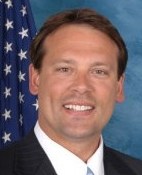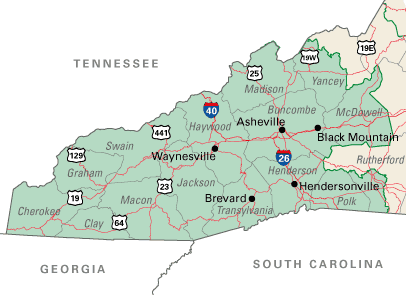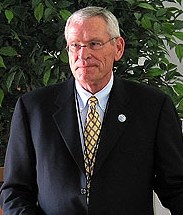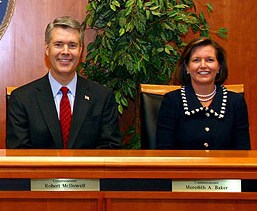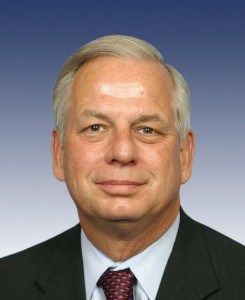 A retiring state senator wants to throw North Carolina consumers under the bus with new legislation that could cost residents millions in savings on their cable, telephone, and broadband bills.
A retiring state senator wants to throw North Carolina consumers under the bus with new legislation that could cost residents millions in savings on their cable, telephone, and broadband bills.
Senator David Hoyle (D-Gaston), has introduced S1209 — what Hoyle calls “The Nonvoted Local Debt for Competing System Act.” We call it “The Anti-Consumer Muni-Killer Act,” representing little more than a lavish parting gift to telecommunications companies that have supported Hoyle for years.
As we have been reporting here, here, here and here for the past few months, the telecom industry has pulled out all the stops looking for friends in the state legislature to do their bidding. This year, the industry is following the game plan it has used successfully in other states to kill potential community-based competition for their broadband duopoly.
The state’s cable and phone companies (and their legislator lackeys) argue that taxpayers should not be on the hook for municipally-owned networks. In the guise of “protecting consumers,” Hoyle and his bill’s co-sponsors would compel municipalities to fund municipal broadband projects with General Obligation B0nds — a regulatory minefield that includes referendums held at taxpayers’ expense and direct taxpayer involvement in the funding process.
As we’ve discussed earlier, Hoyle’s proposal would compel endless referendums for everything from system construction and financing to basic system upgrades and repairs. The implications of such legislation:
- It makes municipal broadband projects untenable. What local government would consider a municipal project that would require endless referendums? The only thing Hoyle didn’t include in his bill was a mandatory public referendum about where the engineers should order lunch.
- Someone has to pay for the referendum process — North Carolina taxpayers. So much for protecting the taxpayer!
- The legislative minefield Hoyle lays for local communities is tailor-made for well-financed telecom industry opposition campaigns that are designed to demagogue municipal competition while tying the hands of communities to fight back.
The irony is, the current system already in place in North Carolina protects state taxpayers.
Both proposed and operational municipal broadband systems rely on Revenue Bonds that have to be approved by the North Carolina Local Government Commission. These Revenue Bonds are not taxpayer-funded, and local residents are not on the hook should something go wrong. The financing agreements with investors are designed to pay off the costs of such systems over time and they then become self-supporting. But even from day one, municipal broadband represents an asset to a community’s efforts to attract digital economy jobs.
They also save you money. Just ask the residents of Wilson, who didn’t face a rate increase outpacing inflation and finally had an alternative for “good enough for you” broadband from current providers.
Unfortunately, the current system is no good for Senator Hoyle because it doesn’t protect his friends in the phone, cable, and broadband industry, threatened with competition that would derail their duopoly gravy trains for good.
Hoyle should be willing to admit as such, considering his friends in the cable industry already have. Marcus Trahen, a lobbyist for the North Carolina Cable Telecommunications Association told legislators at a Revenue Laws Study Committee meeting, “We don’t care if cities have internal systems; what we are worried about is competition.”
Under the guise of “protecting” taxpayers, Hoyle only manages to guarantee fat profits for Time Warner Cable, AT&T, and CenturyLink (formerly Embarq) without better pricing and service for you. Perhaps Hoyle forgot North Carolina is ranked 41st out of 50 states for its comparatively-mediocre broadband services, mostly provided by those three companies.
Hoyle also argues that publicly owned systems harm private industry, despite the fact many in private industry support municipal broadband. Several letters of opposition to S1209 have been sent to legislators from companies like Google, Intel, Alcatel-Lucent, and five private provider trade associations.
Hoyle doesn’t plan to stick around and watch the damage his proposed bill would create for North Carolina’s economic and high tech future. After he retires from public office, his bill would leave a legacy of tied hands among local communities from Asheville to Greenville, and all points in-between. Doesn’t your community deserve a better option? If you want a third option that could dramatically lower prices and offer better service, shouldn’t local officials have the right to offer it if current providers won’t?
The fact is, none of these municipal projects would even be proposed if the cable and phone companies delivered the service communities want at fair prices. Cable and phone companies don’t need to spend hundreds of thousands of dollars to defeat these projects — they could simply lower their prices and offer the kind of service consumers demand.
For Hoyle’s part, he’s shocked… shocked to discover consumers are offended by his telecom-friendly attitudes. He told Indy Weekly, “the lobbyists don’t influence me; I’m in the pocket of the people that provide jobs for this state, and Time Warner Cable employs 8,500 — I can’t imagine anyone that would want to compete with that.”
Senator Hoyle weighed the interests of Time Warner Cable against 9.4 million North Carolina consumers and sided with the cable company.
Let’s push the scale in the other direction.
What You Need to Know
The author of S1209 is Sen. David Hoyle (D-Gaston).
The bill currently lists five co-sponsors:
- Sen. Peter S. Brunstetter (R-Forsyth)
- Sen. Clark Jenkins (D-Edgecombe/Martin/Pitt)
- Sen. Jerry W. Tillman (R-Montgomery/Randolph)
- Sen. Dan Blue (D-Wake)
- Sen. Fletcher Hartsell (R-Cabarrus/Iredell)
The latter two, Sens. Blue and Hartsell were formerly on our supporters list, and we’re reaching out for clarification as to why they are listed as co-sponsors on this bill. We’ll update our readers about whether they will stand with North Carolina consumers or the telecom industry as soon as we hear back from their offices.
Your Action Alert
You must immediately contact legislators on the Senate Finance Committee, set to consider Hoyle’s bill this week, most likely on Wednesday. But don’t wait until then. You should be making contact today, just in case the bill gets voted on earlier, before opposition has a chance to build.
Tell the senators to oppose S1209 for the benefit of North Carolina’s economic future:
- Make it clear voting for this bill is just another way to stop municipal broadband from delivering the kind of broadband service North Carolina wants and needs to grow its economy.
- S1209 was custom-crafted to protect the interests of incumbent phone and cable companies, not North Carolina consumers.
- The current system already protects taxpayers because they are not paying for municipal broadband projects. S1209 forces local governments to spend taxpayer funds on endless referendums.
- Explain you are already empowered to stop unwanted municipal projects through organized vocal opposition at town meetings as well as at the ballot box. But your town would not be empowered to offer services private providers refuse if S1209 becomes law, because the legislation forces such projects into miles of red tape.
- Worst of all, S1209 gives phone and cable companies plenty of time to demagogue such projects, spending ratepayer funds in a hopelessly mismatched fight.
- Let them know you see through S1209’s anti-competitive intent, and you’re prepared to vote for those who stand up for North Carolina consumers and oppose these types of telecom industry-friendly bills.
Important! When writing, -DO NOT- simply carbon copy everyone on a single e-mail message. Those mass mailings are discarded, unread. For maximum effectiveness, send an individual e-mail to each legislator and another to their legislative assistant. Calling the legislator’s office can be even more effective and immediate.
Here is the list:


 Subscribe
Subscribe
